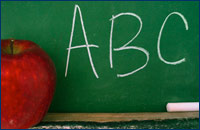What’s New in the Classroom: Webcasts and Writing Bees
 One of my biggest challenges in teaching students to write has been figuring out how best to teach “the basics”: grammar, punctuation, citation, and other sentence-level editing skills. Before this year, I always devoted several class periods to just those topics. Because students tend to enter law school with very different ability levels, however, those classes did not seem as effective as I would have liked. The students who needed little or no instruction about grammar and punctuation were invariably bored, and other students (many of whom have candidly admitted that they have not studied grammar in years, if ever) needed more than those few classes devoted to those topics. So how does the instructor effectively teach to the entire class? It is difficult, to say the least.
One of my biggest challenges in teaching students to write has been figuring out how best to teach “the basics”: grammar, punctuation, citation, and other sentence-level editing skills. Before this year, I always devoted several class periods to just those topics. Because students tend to enter law school with very different ability levels, however, those classes did not seem as effective as I would have liked. The students who needed little or no instruction about grammar and punctuation were invariably bored, and other students (many of whom have candidly admitted that they have not studied grammar in years, if ever) needed more than those few classes devoted to those topics. So how does the instructor effectively teach to the entire class? It is difficult, to say the least.
To remedy the problem, I decided to move all of my instruction about grammar, punctuation, precision, conciseness, and citation out of the classroom and onto the web. I find it difficult to teach writing without a visual, so I created PowerPoint presentations (or Word documents) with rules and examples, and I recorded short lectures over the top of the presentations or documents. When I was finished, I had a series of audio-visual presentations that students could watch at times convenient for them. If a student already understood how to identify and correct dangling modifiers, there was no need to watch the webcast about modifiers. If, however, the student had never heard of a dangling modifier and needed to go over the examples more than once, the webcast was there for repeated viewings.
I was concerned, however, that if I put the material on the web, students would simply ignore it, so I wanted some way to hold them responsible for learning the material. Out of that concern came my second teaching innovation: the Writing Bee.


